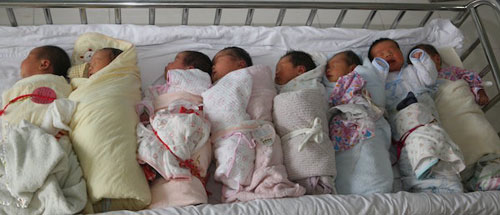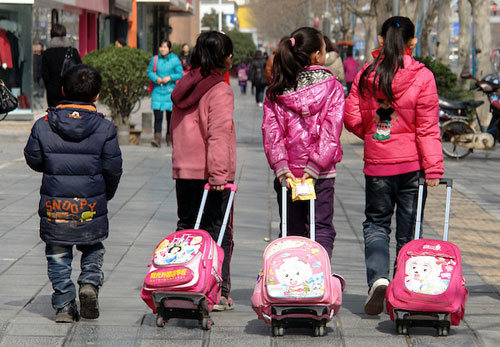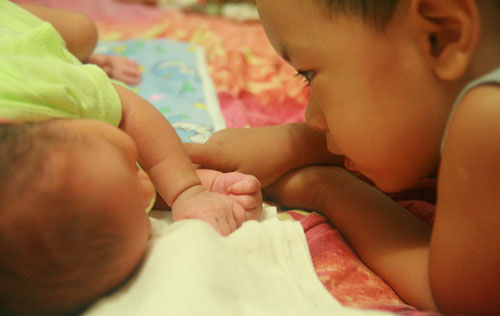
8 newborn babies in a hospital of Xiangyang City, central China's Hubei Province. Xinhua News Agency
(Li Na & Shuang Rui, Xinhua)Liu Min, 31, lies on the bed quietly, looking at her newborn second son. She feels a sense of loss in joy – because she failed to have a daughter.
Liu lives in Beijing. Four years ago, the birth of her first son brought her great happiness. In order to care for her son, she gave up her job in the legal department of an insurance company, with an annual salary of more than 200,000 yuan (about 30,000 US dollars).
In 2015, China’s “one child policy” was phased out. Liu and her husband, who had just founded his own air conditioner business, decided to have another child. "Although having a second child made life more difficult and increased the pressures on us, we still want to have a daughter," Liu says.
While her "obsession" with having a daughter is "a challenge to my parents' 'patriarchal' ideology", she is more concerned about the pressures of life. “In Beijing, the average home can cost from 5 million to 10 million yuan (about 750,000 to 1.5 million US dollars),” Liu says. “I worry about the cost of education, marriage and homes for my two sons in the future.”
Liu was born in Ding’an County, in south China’s Hainan Province, in 1985. She was the family’s fourth daughter. Her infant name was "Zhao Di", which means “bringing a younger brother”. She was given this name because "my parents especially wanted to have a son".
When she was 2 years old, the family welcomed a fifth child – a boy. “When my brother was born, my family invited all of our relatives and neighbors to a feast. We lit firecrackers all day,” she recalls. “In the traditional view of people in my hometown, only boys can keep the family line alive.”
Because they had more children than the family planning policy stipulated, all the money Liu's father earned went to pay the penalties: “We lived in straitened circumstances. Sometimes, my sisters and I only ate one meal of porridge a day."
In order to slow population growth in line with the provision of the state’s resources, China started strict implementation of a one-child policy, mostly among its urban population, in the late 1970s. This was established as a basic state policy in 1982, and in 2001, with the promulgation of "Population and Family Planning Law of the People's Republic of China", the policy became law.
However, in a largely agricultural society, many families are still influenced by the traditions of carrying on the family line and raising sons to provide for their parents’ old age. Many families lost everything to fines for having more children than the family planning policy stipulated.

In Zhengzhou City, Henan Province, four children are on the way to school.Wang Song/Xinhua News Agency
China's gender ratio at birth has increased rapidly from 107 boys to 100 girls in 1982 to 121.18 boys in 2004. Despite the ratio falling to some extent since 2009, according to the National Bureau of Statistics, in 2015 it was 113.51 boys to 100 girls, which was still well off the normal value of 103 boys to 107 girls.
The gender imbalance has resulted in an excess of single men of marriageable age in some regions, especially in poverty-stricken rural areas. At the beginning of this year, it was reported that the lack of women of marriageable age in the central province of Henan was driving an unprecedented frenzied bidding for brides with “betrothal gifts”.
According to a village cadre in Henan, gifts from the bridegroom to the bride's family would cost 10,000 yuan (about 1,500 US dollars) seven or eight years ago. Today, grooms are spending more than 100,000 yuan (15,000 US dollars). "Many families toil for many years just to pay for a home. The money for betrothal gifts, feasts and home appliances is borrowed from every possible friend or relative. Getting married means a burdensome debt, which is heavier for families with more boys," the cadre said.
Due to the rising cost of raising children, "the second child age" means rural and urban working families now hope for a daughter if they already have a son.
In Liulin Village, in Henan’s Gushi County, Wang You, who has already had a son, discussed with his wife the idea of having a daughter. “Instead of sticking to the tradition of ‘the more sons, the more blessings’, people of my age are content to have a son and a daughter, if possible,” Wang says.
In a private maternity hospital in Beijing, traditional therapist Xuan Xuan, 28, and her husband are waiting for their pre-pregnancy check. They already have a 2-year-old daughter. For the second conception, Xuan Xuan has researched folk prescriptions on the Internet. She has replaced the fizzy drinks that her husband likes with soda water, which, it is said, can help regulate the acid and alkaline environment of the body, so the possibility of conceiving a boy will be greater. "If the second baby is still a girl, I'll still give birth to her as long as she is healthy,” she says. “But before that, we should try what we can."
In the same hospital, architect Wang Yuan and his 3-year-old son are accompanying his wife for her six-month pre-natal check. A month into the pregnancy, Wang sent a sample of her blood to a medical lab in Hong Kong, which determined their second child would be a girl. "If it were a boy, I think we wouldn't keep it," Wang’s wife says. “As our society has become more egalitarian, men and women enjoy the same education and job opportunities. But for parents, a daughter seems closer.”

In Beijing, Saja's 2-year-old son Tang Tang stare at his newborn sister Xiao Hua. CICPHOTO
In 2003, China's Family Planning Commission, the Ministry of Health and the State Food and Drug Administration jointly issued the "Provisions on Banning Identifying the Gender of a Fetus for Any Non-medical Need and Artificial Termination of Pregnancy Due to Preference of Gender", which effectively banned abortions based on the gender of the fetus.
But today many parents want to know the gender of their unborn baby. The doctor, who carried out the check on Wang's wife, said many parents who went to private hospitals for pre-natal checks had managed to learn the gender of their baby through various channels. "In some cases, the baby’s gender is not as hoped for, but most parents still chose to keep the child rather than abort it."
In 2014, authorities in parts of Henan and Jiangsu provinces launched a crackdown on the identification of the gender of unborn children and abortions for non-medical needs. The move was meant to rebalance the gender ratio at birth. Authorities stipulated that parents with permission to have two children who aborted a child to a gender preference would have the permission revoked.
In February this year, a maternity website visited by 10 million people asked in a survey: “Would you choose an abortion if the gender of your fetus was not what you wanted?” More than 90 percent of 1,000 mothers who responded replied, "I'd accept whatever comes to me".
However, for many grandparents living in rural areas and small towns, a grandson is still more welcome than a granddaughter.
Liu's mother-in-law left her home in a small county of Hunan Province to look after her newborn grandson in Beijing. Despite saying, "It’s quite hard to raise a boy nowadays", her face couldn't conceal her joy and pride when she held the boy.
